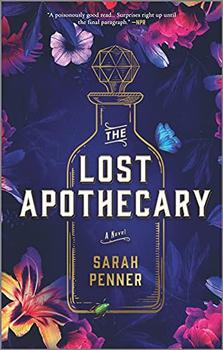Summary | Excerpt | Reading Guide | Reviews | Beyond the book | Read-Alikes | Genres & Themes | Author Bio

A Novel
by Sarah PennerSarah Penner's debut novel The Lost Apothecary was rated 4 or 5 stars by 22 of our 23 First Impressions reviewers.
What the book is about:
Contemporary London and its 18th-century counterpart collide in this historical mystery of a back-alley female apothecary who secretly distributes toxins to women to avenge the men who have betrayed, hurt and abused them. Intertwining the two timelines with three female characters, Sarah Penner depicts these women struggling with betrayal and loss as they sever the bonds imposed on them by the men in their lives (Maryanne B). Nella, the apothecary; Eliza, her accidental assistant; and Caroline, an Ohioan on a terribly disrupted wedding anniversary trip to England, cross paths when Caroline discovers an artifact which has washed up on the banks of the Thames (Maribeth R).
Readers appreciated Penner's focus on the everyday lives of women in 18th-century London.
I was fascinated by the idea of a woman helping other women who find themselves in extremely bad situations in an era where there are no other solutions. And to have the current character doing research on the characters in the past is wonderful (Colleen T). This book smartly twines a current protagonist with past lives of women and girls — one of my favorite story lines (Gayle C). One of the things that I really liked about The Lost Apothecary was that it is about ordinary people. Most historical novels I have read are about the lives of royalty. Sarah Penner did a lot of research on everyday life in the 1790s (Alyce T).
Many also commented on the author's skill in handling the dual-timeline format.
Sarah Penner does a wonderful job weaving together the stories of the main characters, which take place in London both during the 18th century and present day. It's never confusing and there are interesting twists that keep you guessing (Carole C). This author's writing style is easy and streamlined, and the changes in time periods are painless (Kim B).
Reviewers would recommend Penner's novel for book clubs, as long as the groups are not bothered by some disturbing material.
It may be the unpleasant subject matter that would keep me from recommending this book to someone else, but I suspect book clubs would find it ripe with discussion points (Martha G). This complex story invites and stimulates both discussion and thoughtful contemplation. Overall, the tale is a dark one dealing with murder, deception and varying degrees of loss, some explicitly described. I would not recommend this book without caution concerning its content (Ruth C).
Some remarked that the plot and characters could have been better executed and more engaging.
The plot concept was brilliant and hooked me with just the description. I did feel that the execution of the plot, while interesting, was simplistic in its unveiling. Additionally, some of the character events felt unsubstantiated (Dorothy G). The first third of the book introduced the characters, but because of their negative attitudes, I found them unlikable. I became more engaged as the historical revelations took over in the middle development of the plot (Martha G).
Still, readers felt that the author's descriptions and knowledge of history created a strong visual sense of the story.
The chapters set in 18th-century London seem well researched with their descriptions of the people, houses and social gatherings of the times. I found the information on poisons fascinating (Catherine S). The characters are quite well drawn, as are the physical descriptions. One can easily envisage the secret room of the apothecary, the fog of the river, the library (Mary D).
And the book's twists and turns held their attention, especially towards the end.
If I didn't have other necessary responsibilities, I would have undoubtedly read this book in one sitting; as it was, I stayed up much too late finishing it (Mary D). Just when I thought I knew where the story was going, it took another turn (Christine P). I must admit that I did stay up all night to finish The Lost Apothecary by Sarah Penner. The twists and turns in the final chapters required it (Barbara R).
![]() This review was originally published in The BookBrowse Review in March 2021, and has been updated for the
March 2022 edition.
Click here to go to this issue.
This review was originally published in The BookBrowse Review in March 2021, and has been updated for the
March 2022 edition.
Click here to go to this issue.

If you liked The Lost Apothecary, try these:

Madame Sosostris and the Festival for the Brokenhearted
by Ben Okri
Published 2025
In this modern fable with the impish magic of A Midsummer Night's Dream, a masked ball makes two upper-class British couples see each other in a new light.
A wise, enchanting novel about love, power, and our many selves—past and future, public and private—from the Booker Prize–winning author.

by Ariel Lawhon
Published 2024
From the New York Times bestselling author of I Was Anastasia and Code Name Hélène comes a gripping historical mystery inspired by the life and diary of Martha Ballard, a renowned 18th-century midwife who investigates a shocking murder that unhinges her small community.
Your guide toexceptional books
BookBrowse seeks out and recommends the best in contemporary fiction and nonfiction—books that not only engage and entertain but also deepen our understanding of ourselves and the world around us.